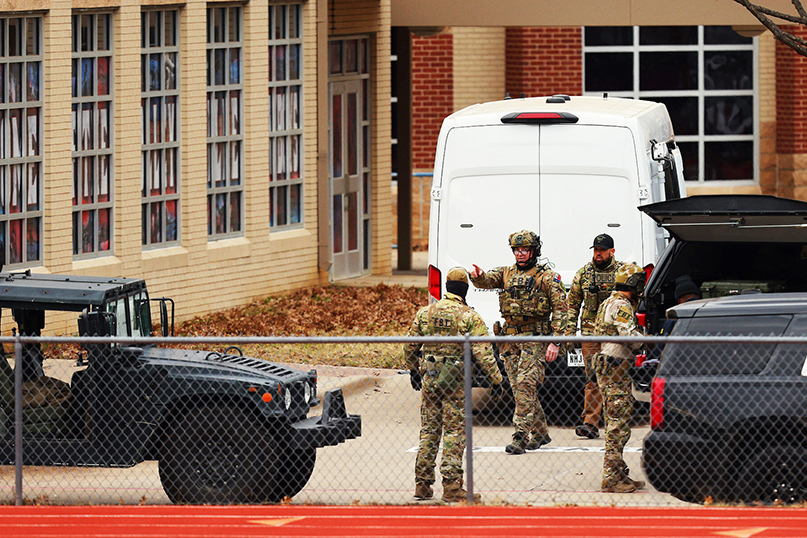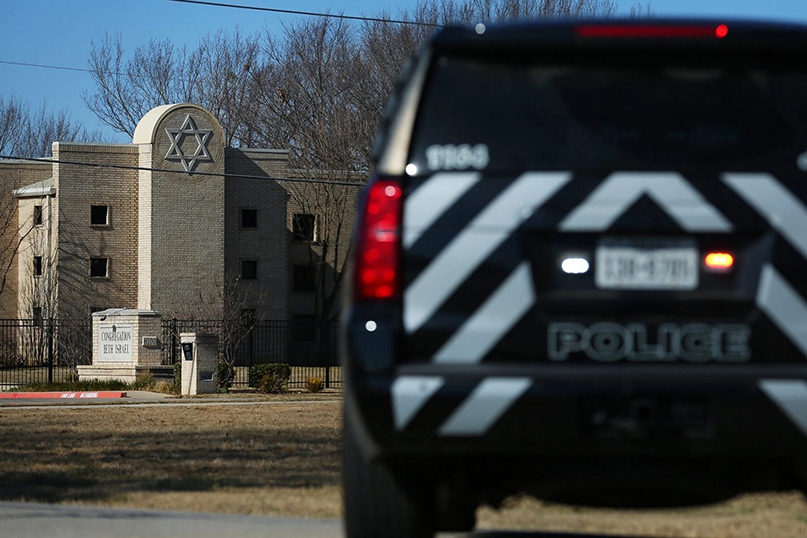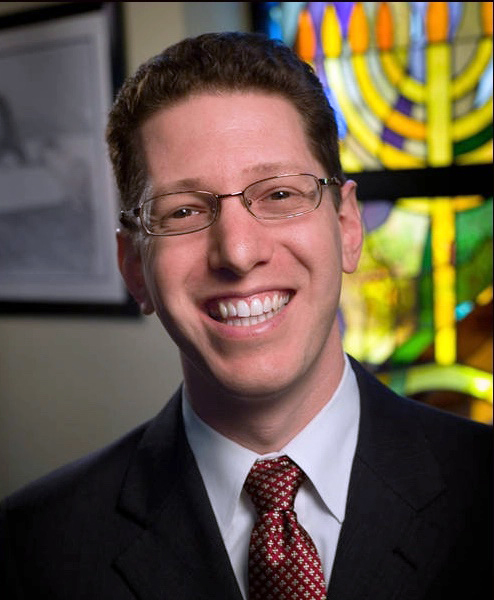
By Stacey Dresner
Last week Rabbi Charlie Cytron-Walker of Congregation Beth Israel in Colleyville, Texas said that he and the three other hostages held at the synagogue for more than 11 hours on Jan.15 by armed gunman Malik Faisal Akram may not have survived without the security training his congregation has received from law enforcement agencies.
“Over the years, my congregation and I have participated in multiple security courses from the Colleyville Police Department, the FBI, the Anti-Defamation League, and Secure Community Network,” Cytron-Walker wrote in a statement. “Without the instruction we received, we would not have been prepared to act and flee when the situation presented itself.”
Jewish communities around Southern New England are well-aware of the importance of such security training for their synagogues and other Jewish agencies in light of the increased amount of antisemitic violence that has been seen in recent years.
Last year the Jewish Federation of Greater Hartford and four Federations in Southern Connecticut both hired Regional Security Advisors (RSA) to improve the physical security of their agencies’ facilities as well as to provide security training to staff.
Michael Shanbrom now serves the Jewish Federations in New Haven, Stamford, Greenwich and Western, Connecticut. Shanbrom is a 20-year veteran of the Federal Bureau of Investigation (FBI), serving in a variety of national security leadership roles within the organization, including Acting Assistant Special-Agent-in-Charge, National Security, in the New Haven Field Office. He also currently serves as police commissioner for the Town of Woodbridge.
John Colangelo is the RSA for the Jewish Federation of Greater Hartford. Colangelo has nearly 30 years of experience in law enforcement, 24 of those with the town of Canton where he retired at the rank of detective. Colangelo also served as a field training officer, conducting Critical Incident Management training, and was the town’s terrorism liaison after 9/11 and a member of the regional Emergency Services Team.
Both Shanbrom in southern Connecticut and Colangelo in Hartford are employed by the Secure Community Network, the official homeland security and safety initiative of the organized Jewish community of North America. Funding for their positions comes from the communities they work in.
The two advisors work with the Federations and their agencies – including Jewish community centers, synagogues, day schools, camps and senior housing.
For the past several months Colangelo and Shanbrom have both been making the rounds to all of the organizations they are responsible for and providing threat, vulnerability and risk assessments of their facilities and training staff in situational awareness, safety and security for greeters, countering active threats, and Stop the Bleed, a medical trauma program.
Reportedly, Rabbi Cytron-Walker in Colleyville and one of the hostages had both participated in SCN’s active threat training last summer.
“Luckily, SCN had been there and had provided training to that synagogue,” Colangelo says. “They actually implemented that training during this situation when they found the appropriate time to run and get away. My goal here in Hartford, and anywhere else I can assist, is to bring this type of training to people. We never want these things to happen, but we want to be prepared for them when and if they do.”
Colangelo now runs two or three trainings a week at Jewish organizations in the greater Hartford area. And that number is now on the rise.
“Even prior to this happening my schedule was filling up,” he says. “The incident in Texas has motivated others who maybe haven’t reached out to me yet to do so. And some who were already signed up have wanted to move up their dates.”
“With the dramatic increase in antisemitic incidents and acts of hate over the past several years, Jewish communal security has never been more important,” says David Waren, president and CEO of the Federation of Greater Hartford. “John’s tremendous knowledge and expertise helps keep our local community safe and secure.”
Colangelo’s colleage, Michael Shanbrom was one of the first people Judy Alperin, president and CEO of the Jewish Federation of Greater New Haven, called when the hostage situation in Colleyville began unfolding.

“I got a heads-up very early on that something was happening, so I was one of the thousands of people who were listening and watching [to the event] on Facebook in real time, and it was horrific,” Alperin says.
“But at the same time, I immediately started to reach out first to our Regional Security Adviser Mike Shanbrom and then, after I heard back from him, to community leadership, with assurances that there were no credible threats in Connecticut. [I wanted] to make them aware of what was going on and the fact that we were working through Mike with all of his local contacts so that we could increase police presence around Jewish facilities during the crisis.
“My worst fear was that this could be something that wasn’t isolated or that there could be copycats,” Alperin adds. “We’re seeing al Qaeda and other terrorist groups using this incident now for propaganda purposes to try to inspire lone wolves and others to go out and conduct similar attacks. So, yeah, I worry about that all the time. There is no question that community security has become one of the most important priorities for our Jewish Federation.”
Shanbrom says that the fact that the hostages at the Texas synagogue were able to put to use their SCN security training to escape their captor “is the finest testament” to the importance of security training. But he adds that that “active threat” training is just one component of the comprehensive safety plan all synagogues should have in place.
“Every single synagogue needs a vulnerability and risk assessment. They all need a security plan for their buildings that includes locked doors and buzzer systems…and they need a good working relationship with law enforcement. It’s a layered approach” to safety and security,” he says.
Shanbrom has at least 100 Jewish agencies in his territory and 50 trainings scheduled to take place this year alone.
Not enough funding
Steven Schimmel, the executive director of the Jewish Federation of Central Massachusett in Worcester, says he was glued to the news footage of the hostage situation in Texas on Jan. 15.
“Our Security Liaison Mark Shear was in communication with the Federation office throughout the incident and updates were provided to our congregation and organizational leadership,” Schimmel noted in a message to his community. “Federation had been working with Secure Community Network prior to this incident to plan a security training to develop a cohort of community security volunteers to oversee local Jewish community events…We will also continue to work with our congregations and organizations to ensure that security protocols are up-to-date, and we will continue to strengthen our relationship with law enforcement and community leaders to address rising antisemitism.”
In the Western Massachusetts Jewish community, which has seen more than its share of antisemitic incidents in recent years, including threats to the Springfield Jewish Community Center in 2017 and an attempted bombing at the Ruth’s House Assisted Living Center in 2020, three agencies received some state funding for security in 2021 in the form of the Nonprofit Security Grant Program (NSGP). The Springfield JCC received $89,500; Sinai Temple in Springfield received $13,504; and Congregation Sons of Zion in Holyoke received $51,530.
But Federal and state grants are not enough to fund security for all Jewish agencies in Southern New England.
“Security costs are hundreds of thousands annually across the region,” says Judy Alperin. “We feel at the Jewish Federation that the Jewish community’s security is one of our top priorities, but our budgets are not set up to fund these things. Our budgets are set up to support and enhance the Jewish community and to do all the good work that we do. So, at what expense, right? There are grants and things but there’s not enough of them. The local Federations have done an incredible job of lobbying the federal government and now our state of Connecticut to be supporting nonprofit security and the fund is up to $180 million dollars coming out of the federal government. And there’s $5 million that came out of the state last year through the bonding program, but it’s not enough.”
Alperin explains that the number of applications for nonprofit security grants by Jewish agencies far exceeded the amount of money in the pot last year, which left hundreds of agencies – including her own JCC – unfunded. JFACT — the Jewish Federation Association of CT— is now lobbying to have both federal and state nonprofit grants in hopes of doubling that funding.
Meanwhile, last week SCN launched “BeAware,” a new security training program that can be taught in-person or accessed online. While BeAware was already in the works, the attack in Colleyville prompted SCN to begin promoting the new training program.
“As we saw in Texas, we cannot pick the time and date of the next incident that will impact our community, but we can choose to prepare,” says Michael Masters, CEO of SCN. “A critical component of preparing is training, and this training will provide crucial skills the Jewish community needs to stay safe. I hope every synagogue and Jewish facility in the United States will participate.”
SCN will be hosting a national on-line preview of BeAware on Jan. 27 at 1 p.m. Participants can register at https://securecommunitynetwork-org.zoom.us/webinar/register/WN_r0VSrYVyQjeOtn6ktcW3og
In wake of Colleyville, Jewish groups push to double federal security grants
By Dmitriy Shapiro
(JNS) Following the Jan. 15 hostage situation at a Texas synagogue, Jewish organizations in the United States have reignited their push for Congress to double the funding of the Nonprofit Security Grant Program (NSGP), ensuring that more targeted nonprofit institutions such as synagogues get federal funding to invest in protection.
While none of the hostages was hurt in the ordeal, organizations such as the Jewish Federations of North America (JFNA) and the Orthodox Union (OU) are pointing to increasing threats to Jewish institutions to justify an increase in the NSGP from $180 million annually to $360 million.
“If the events in Colleyville do not reinforce how crucial nonprofit security grants are in securing our communities, I don’t know what will,” said JFNA president and CEO Eric Fingerhut in a news release on Sunday, Jan. 16.
Elana Broitman, JFNA senior vice president, said the request was not new, as the Jewish community has been calling for $360 million in funding for a number of years. While still not funded at the ideal level, support had been growing—doubling last year to $180 million.
That number was still only enough to cover 45% of funding requests made by nonprofit organizations last year, of which approximately $220 million worth of requests were not granted because of insufficient cash, said Broitman. Another $100 million for the NSGP was written into the Build Back Better bill, which has stalled.
But as Congress works to pass an omnibus spending package before the latest Continuing Resolution (CR) funding the government expires in February, the organizations see this as a perfect opportunity to increase the NSGP grant budget.

(Andy Jacobsohn/AFP via Getty Images)
After the Texas hostage situation, the urgency has increased, she said—not just in the Jewish world but for other targeted communal facilities that can also access the grant funding.
“I mean, the antisemitic trend is horrendous, and there are law-enforcement reports that really show that it is the worst among religiously motivated hate activities. That said, we’re the canary in the coal mine,” said Broitman. “This fund goes beyond Jewish communities, and I think everybody recognizes how important it is.”
The NSGP grants go towards security measures in nonprofit organizations, including religious centers, museums and houses of worship. These measures include the installation of security cameras, secure doors, barriers and active-shooter training drills.
Cytron-Walker said that the training he was provided helped him act against the hostage-taker. Additional security measures through this and other programs also helped avert further loss of life at the Tree of Life Synagogue*Or L’Simcha shooting and other attacks on synagogues.
“When something happens in one place—regardless of what details were in the particular attack—the security risk in other places of course rises because we always worry about copycat attacks. and every incident is a little bit different,” said Broitman. “And so the more we can protect institutions, the higher the bar for breaching those institutions.”
According to Nathan Diament, executive director of the OU Advocacy Center, the $360 million figure was proposed by Senate Majority Leader Chuck Schumer (D-N.Y.) himself a few years ago.
Diament said the omnibus spending package will be the obvious place to include the amount, as congressional leaders and heads of the appropriation committees have started meeting to negotiate the omnibus to cover the remainder of the fiscal year. The $360 million, he said, will be “definitely more in the ballpark of where the demand level is.”
Diament had just concluded a Zoom meeting on Tuesday, Jan. 18, organized by OU with more than 1,000 synagogue representatives from across the nation, in addition to department officials such as U.S. Attorney General Merrick Garland, U.S. Department of Homeland Security Secretary Alejandro Majorkas, FBI director Christopher Wray and FBI deputy director Paul Abbate. Besides messages of solidarity from the administration officials, the synagogue representatives were promised that the agencies would do whatever they could to bolster the community’s security as well as go through practical steps that synagogues could take in the coming weeks.
Diament added that another security measure the OU has been advocating was for the federal government and other grant programs to provide more resources to local police to increase patrols and presence around synagogues and other houses of worship.
Eric Fusfield, director of legislative affairs for B’nai B’rith International, said his organization has long supported the increase.
“One result of Colleyville is the growing awareness that such attacks can occur anywhere, at any time, from multiple sources,” he said. “Also, the FBI’s hate-crimes data affirm that the Jewish community is by far the most vulnerable among religious groups.”
Main Photo: SWAT team members deploy near Beth Israel Synagogue in Colleyville, Texas, Jan. 15. (Andy Jacobsohn/AFP via Getty Images)








 Southern New England Jewish Ledger
Southern New England Jewish Ledger









